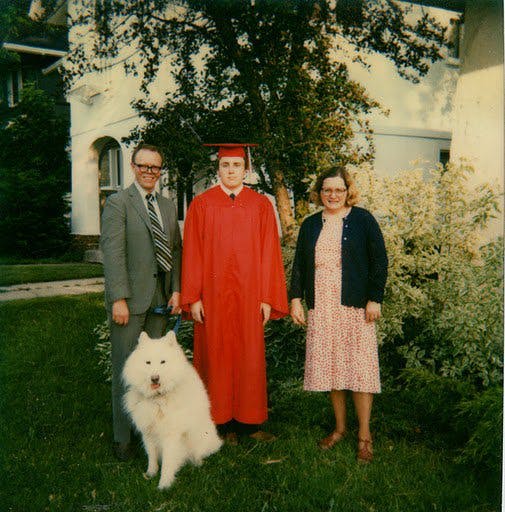There is no such thing as a perfect father. All dads, including me, have moments that make us cringe in hindsight. But I lucked out with my dad – he was ahead of his time.
When the doctor said that my father wouldn’t be allowed in the delivery room for my birth – standard practice in the 1960s called for dads to be in the waiting room, ready to light up a cigar – my parents fired the doctor and found another who allowed him in the room.
When my mother took on a new, high-stress role as the director of one of Milwaukee’s first women’s health care facilities, my father moved his office into our house to keep an eye on me and my teenaged brothers.
When my mother flew off to the United Kingdom to do research for a few weeks, my father picked up the slack with ease. I distinctly remember how irritated he was with the television ads that showed men as helpless around the house. He called these “daddy dummy” commercials.
While I had a great role model, that’s not the case everywhere. According to the annual State of the World Father’s report released today, men around the world need to take on at least 50 minutes more per day in unpaid care and domestic work to reach the level currently being performed by their wives and partners.
This is more than a domestic nicety; men failing to do their fair share has consequences. In countries like the U.S., it can hold back women professionally, reducing their long-term earning potential. In nations experiencing extreme poverty, it often means that girls cannot attend school because they need to help their mothers with domestic chores.
So how do we get dads to do more for their families?
A key takeaway for me is that equal parenting is a lesson that’s passed down from generation to generation – by dads to their sons by leading by example, and by moms to their daughters, by showing the importance of picking a good partner and expecting an equal contribution at home.
As a result of my father’s example, my two brothers and I were committed to equal parenting – though as our wives will certainly attest, not always to perfection.
This doesn’t necessarily mean that all tasks were shared equally. In my case, I became the master planner and implementer of the summer camp matrix for the kids. My wife handled the family books, after I famously failed to pay the water bill. The overall goal was to ensure that half of the responsibilities of being a parent fell on my shoulders.
But it’s not only a generational legacy – policymakers and managers can help enormously.
As lawmakers at the local, state, and national levels consider policies to promote paid family leave, these policies must allow for fathers to take time off with their babies, not only to bond but to develop a fluency in the tough task of taking care of young ones. I took most of my paternity leave after my wife had returned to work, and being solely in charge of my boys made me realize that, while there’s plenty of magic to being a mother, I could also learn how to soothe my son, get him down for a nap, and attempt to heat up something for dinner.
Managers at the workplace must also be committed to pushing for policies providing fathers with equal leave, and for strongly encouraging the dads on their teams to take full advantage of provided parental leave. Experienced dads in the workplace must signal to new fathers that they will be respected – not punished – for taking parental leave, and for taking the time to be at class recitals, after-school lacrosse games, and parent-teacher meetings.
Working dads need to make it clear to the newbies: You will never get those moments back.
I remain inspired by my father’s continued commitment to gender equality and the gift he gave me by showing me the importance of equal parenting. One day, while guarding my mother’s health clinic against demonstrators, he was brutally assaulted by a protester who shattered my father’s arm. But he mended and kept on fighting to protect my mother, my mother’s clinic, and the women who desperately needed reproductive health care services. Even with his arm in a cast, dad helped with the household chores.
We need more of these dads in the world today, and that’s why it’s so important that we read and learn from the State of the World Father’s Report.

